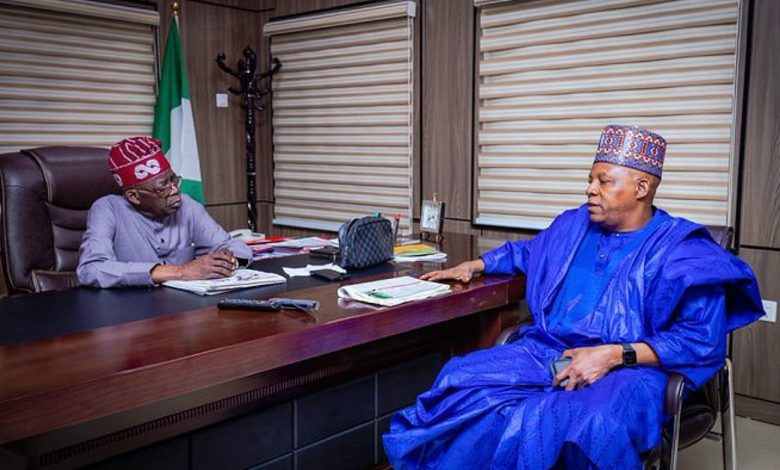
President Bola Ahmed Tinubu-led Nigerian government has claimed that the country’s economy witnessed growth despite galloping inflation and monumental poverty in the country.
A report released on Monday by the country’s statistics service said “Nigeria’s Gross Domestic Product (GDP) grew by 3.46% (year-on-year) in real terms in Q3 2024.”
The National Bureau of Statistics (NBS) noted that the growth rate is higher than the 2.54% recorded in Q3 2023 and higher than Q2 2024 growth of 3.19%.
This report came amid the struggles of Nigerians with the existential realities of rising inflation and extreme poverty in the West African country.
Meanwhile, NBS said in a recent report that Nigeria’s inflation rate rose for the second straight month in October 2024, climbing to a four-month high of 33.9% from 32.7% in September.
According to the statistical office, the rise was driven primarily by escalating food prices, soaring energy costs and ongoing volatility in foreign exchange markets.
Food inflation, which makes up most of Nigeria’s inflation basket, quickened further to 39.2% in October, up from 37.8% in September, amid reduced harvests caused by severe flooding and the ongoing crisis in key agricultural regions.
Also, a development update report released by the World Bank in October shows that over 129 million Nigerians now live below the national poverty line. This represented a sharp rise from 40.1 per cent in 2018 to 56 per cent in 2024.
World Bank blamed the worrisome development on inflation, poor economic management and external shocks.
“With growth proving too slow to outpace inflation, poverty has risen sharply. Since 2018, the share of Nigerians living below the national poverty line16 is estimated to have risen sharply from 40.1 per cent to 56.0 per cent.
“Combined with population growth, this means that some 129 million Nigerians are living in poverty. This stark increase partly reflects Nigeria’s beleaguered growth record. Real GDP per capita has not recovered to the level it was at prior to the oil price-induced recession in 2016”, the report stated.
NIGERIA ECONOMY CRISIS
In October, a white man was filmed on the street of Lagos, distributing loaves of bread to residents who queued for the free staple, in a development that highlights the extent to which citizens were battered by hunger amid the nation’s worst cost-of-living crisis under President Bola Tinubu-led Nigerian government.
The country is facing its worst economic crisis in decades, with skyrocketing inflation, the national currency in free-fall and millions of people struggling to buy food. Only two years ago Africa’s biggest economy, Nigeria is projected to drop to fourth place this year.
The pain is widespread. Unions strike to protest salaries of around $20 a month. People die in stampedes, desperate for free sacks of rice. Hospitals are overrun with women wracked by spasms from calcium deficiencies.
Although, Tinubu increased the minimum wage — after strike action and months-long negotiations with labour unions — from ₦30,000 to ₦70,000, his government has increased spending for officials at a time of nationwide starvation.
For workers earning the new ₦70,000, or $43 per month minimum wage, capricious inflation and naira value have inflicted too much damage for the changes to make any difference in their lives.
The crisis is largely believed to be rooted in two major changes implemented by Tinubu, who took over office 17 months ago; the partial removal of fuel subsidies and the floating of the currency, which together have caused major price rises.
Over a year after Tinubu declared end to fuel subsidy, the fuel price which had been hiked a few times during his first year in office, officially hit the ₦1,000 mark in early October, as oil marketers including state-run Nigerian National Petroleum Corporation (NNPC) Limited, adjusted their pumps in Abuja to ₦1,030 per litre and those in Lagos State did to ₦998, compounding the woes of the citizens who power their vehicles, and generating sets with petrol, no thanks to decades-long epileptic electricity supply.
This follows after the NNPC Limited withdrew from being middleman between the oil marketers and the Aliko Dangote-owned refinery for the supply of fuel.
Dangote had also urged the president to fully hand off fuel subsidy.
In recent months, the nation has suffered an acute fuel scarcity that led some outlets with fuel to sell at exorbitant prices above ₦1,100 per litre while black market prices exceeded ₦1,300.
A nation of entrepreneurs, Nigeria’s more than 200 million citizens are skilled at managing in tough circumstances, without the services states usually provide. They generate their own electricity and source their own water. They take up arms and defend their communities when the armed forces cannot. They negotiate with armed kidnappers when family members are abducted.
But right now, their resourcefulness is being stretched to the limit.
Police and other security agencies clamped down on protests after citizens frustrated by the high cost of living repeatedly took to the streets, demanding that the government do more to help the vulnerable.
In August, Amnesty International accused Nigerian security forces of killing at least 21 protesters during a week of economic hardship protests.
Security forces denied responsibility for deaths during the protests.
